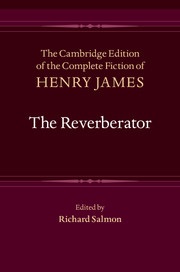Book contents
- Frontmatter
- Contents
- List of Illustrations
- Acknowledgements
- List of Abbreviations
- General Editors’ Preface
- General Chronology of James’s Life and Writings
- Introduction
- Textual Introduction
- Chronology of Composition and Production
- Bibliography
- The Reverberator
- Glossary of Foreign Words and Phrases
- Notes
- Textual Variants I : Substantive Variants up to Copy Text
- Textual Variants II : Substantive Variants after Copy Text
- Emendations
- Appendices
V
Published online by Cambridge University Press: 23 April 2021
- Frontmatter
- Contents
- List of Illustrations
- Acknowledgements
- List of Abbreviations
- General Editors’ Preface
- General Chronology of James’s Life and Writings
- Introduction
- Textual Introduction
- Chronology of Composition and Production
- Bibliography
- The Reverberator
- Glossary of Foreign Words and Phrases
- Notes
- Textual Variants I : Substantive Variants up to Copy Text
- Textual Variants II : Substantive Variants after Copy Text
- Emendations
- Appendices
Summary
GASTON PROBERT made his plan, imparting it to no one but his friend Waterlow, whose help indeed he needed to carry it out. These confidences cost him something, for the clever young painter found his predicament amusing and made no scruple of showing it. Probert was too much in love, however, to be discountenanced by sarcasm. This fact is the more noteworthy as he knew that Waterlow scoffed at him for a purpose—had a theory that that kind of treatment would be salutary. The French taste was in Waterlow's “manner,” but it had not yet coloured his view of the relations of a young man of spirit with parents and pastors. He was Gallic to the tip of his finest brush, but the humour of his early American education could not fail to obtrude itself in discussion with a friend in whose life the principle of authority played so large a part. He accused Probert of being afraid of his sisters, which was a crude way (and he knew it) of alluding to the rigidity of the conception of the family among people who had adopted and had even to Waterlow's sense, as the phrase is, improved upon the usages of France. That did injustice (and this the artist also knew), to the delicate nature of the bond which united the different members of the house of Probert, who were each for all and all for each. Family feeling among them was not a tyranny but a religion, and in regard to Mesdames de Brécourt, de Cliché and de Douves what Gaston was most afraid of was seeming to them not to love them. None the less Charles Waterlow, who thought he had charming parts, held that the best way had not been taken to make a man of him, and the spirit in which the painter sometimes endeavoured to repair this mishap was altogether benevolent, though the form was frequently rough. Waterlow combined in an odd manner many of the forms of the Parisian studio with the moral and social ideas of Brooklyn, Long Island, where his first seeds had been implanted.
- Type
- Chapter
- Information
- The Reverberator , pp. 44 - 52Publisher: Cambridge University PressPrint publication year: 2018

